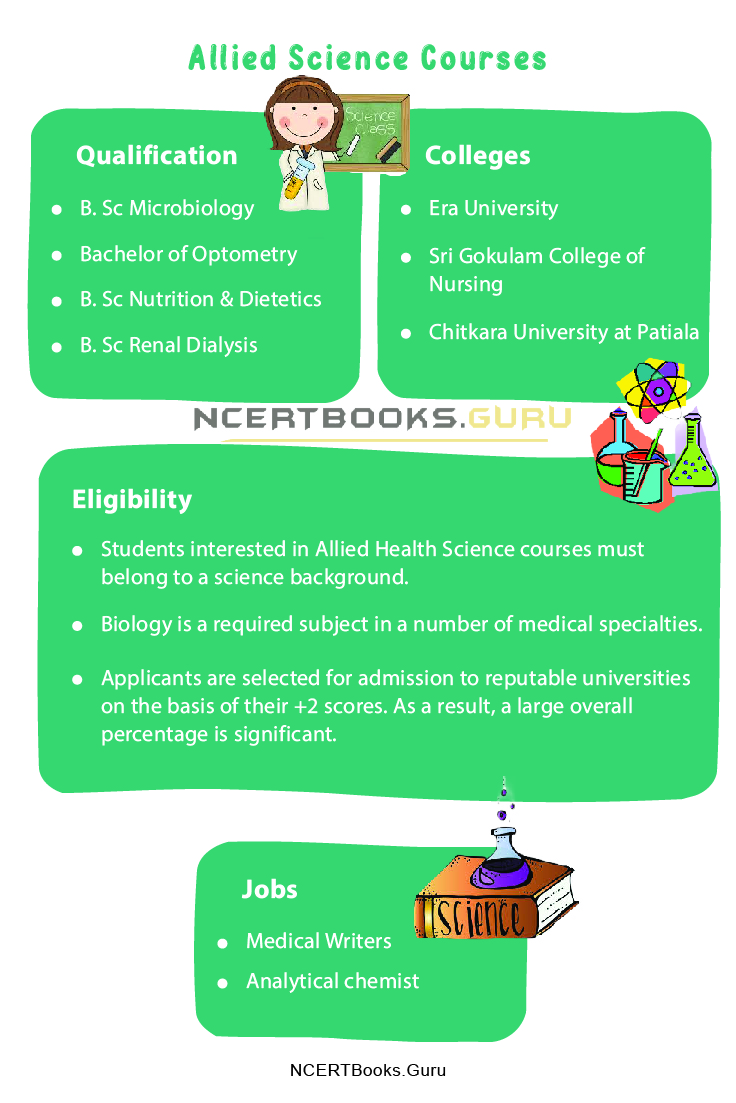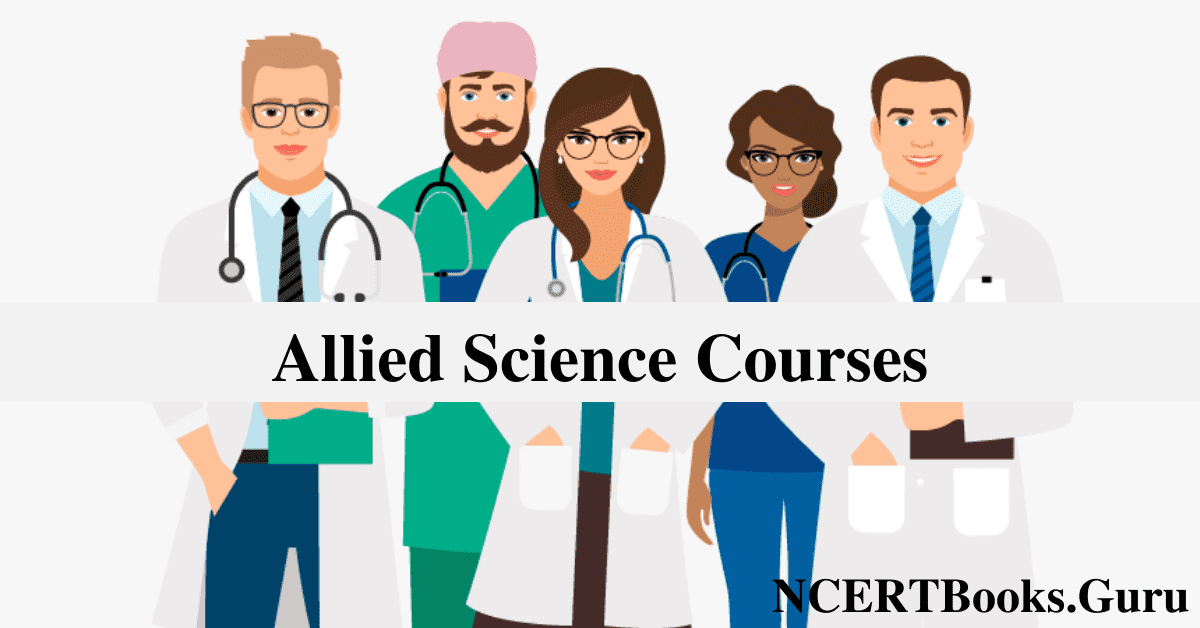Allied Science Courses in India: Allied science is concerned with all sorts of diagnostic procedures used in the medical field (such as blood analysis, histopathology, pathological analysis, and radiography) is extremely important in the treatment of patients. The term “allied medical sciences” refers to a wide variety of fields that create health care professionals who are not doctors. To achieve the greatest patient results, allied health practitioners collaborate with other members of a multidisciplinary health team.
Get to know the important details about Allied Health Science Courses such as course benefits, eligibility, duration, fees, salary, jobs, top colleges, and career scope from this page.
Get to Know More about other types of Course Details Streamwise, and Category wise.
- About Allied Science Courses
- List of Allied Science Courses
- Benefits of Allied Science Courses
- Allied Science Courses Eligibility
- Allied Science Courses Duration & Fees
- Top Allied Sciences Colleges in India and Abroad
- Admission Process for Allied Science Courses
- Allied Science Courses Career Scope
- Allied Science Courses Jobs
- Salary of Allied Science Courses
- FAQ’s on Allied Science Courses in India
- Conclusion
About Allied Science Courses
Allied science performs a crucial part in the development of modern health conditions. The three-year BSc healthcare program provides students with the best possible learning environment. Medical science has spread out to many specialities as technology and research have advanced, each requiring time and devotion to master.
Allied Health Practitioners are working on the skills to prevent, diagnose, treat, and rehabilitate people from diseases. Allied sciences deal with medical diagnostic techniques such as pathological analysis, blood analysis, histopathology, and radiography. Candidates who have completed these Allied courses will get jobs in top companies with a minimum salary of INR 2 lakhs per annum.
List of Allied Science Courses
Here is a list of some of the best life science courses provided at the undergraduate, postgraduate levels. These courses cover a variety of topics for a bachelor’s degree in life sciences, B.Sc Medical Courses. It may open the path for a career in education, research, or industry.
- B. Sc Microbiology
- Bachelor of Optometry
- B. Sc Nutrition & Dietetics
- B. Sc Radio-Imaging Technology
- B. Sc Neurophysiology Technology
- B. Sc Operation Theater Technology
- B. Sc Medical Laboratory Technology
- B. Sc Cardiac Care Technology
- B. Sc Renal Dialysis
- M. Sc Nutrition & Dietetics
- M. Sc Medical Laboratory Technology
- M. Sc Radio-Imaging Technology
- M. Sc Operation Theater Technology
- M. Sc Microbiology
- PhD Microbiology
- PhD Nutrition & Dietetics
- PhD Radio Imaging & Technology
Benefits of Allied Science Courses
Allied Health Practitioners are a subset of medical professionals. They will give direct medical treatment, healing, medicine, diagnostics, and health development measures, as well as a number of technical and support workers, to help people achieve and maintain their optimal physical, sensory, psychological, cognitive, and social functions.
Medical diagnostic procedures are employed in the medical sector and are particularly important for patient treatment. The role of allied health workers in providing effective treatment has been significant With technology-assisted diagnosis.
Allied Science Courses Eligibility
The delivery of health or associated services, such as evaluation, identification, and dietary and nutrition services; illness and disorder prevention; rehabilitation and health system management is challenging for allied health professionals. Graduates will find work in a variety of facilities, including health insurance companies, academic programs at teaching hospitals, medical transcription businesses, medical research organizations, and business process outsourcing enterprises, among others. Postgraduate programs in healthcare management and health information administration are also available to students.
- Students interested in Allied Health Science courses must belong to a science background.
- Biology is a required subject in a number of medical specialties.
- Applicants are selected for admission to reputable universities on the basis of their +2 scores. As a result, a large overall percentage is significant.
- Allied medical science students should have good critical thinking and research abilities in order to be able to assess and comprehend facts and make judgments.
- To work in this field, you must be able to endure adverse situations and have a high level of physical endurance.
- Most universities need a minimum aggregate score of 50% or more for entrance to undergraduate courses. Some Biology courses may have a different minimum 50% requirement.
- As part of the admissions process, Indian institutions have entrance tests.
- Depending on the subject you are applying for, universities overseas may need proficiency exams such as IELTS, GRE, TOEFL, SAT, ACT, and others.
Allied Science Courses Duration & Fees
| Course Name | Duration | Allied Science Courses Fees |
|---|---|---|
| B.Sc. (Microbiology) | 3 years | INR 62,500/- |
| Bachelor of Optometry | 4 years | INR 62,500/- |
| B. Sc. (Nutrition & Dietetics) | 3 years | NR 62,500/- |
| B. Sc Cardiac Care Technology | 3 years | INR 72,500/- |
| B. Sc Radio-Imaging Technology | 3 years | INR 77,500/- |
Top Allied Sciences Colleges in India and Abroad
Here is the list of best colleges of courses in Allied Health Sciences stream.
- Sri Ramachandra Medical College & Research Institution in Chennai
- Shyam Inst. Of Engineering and Technology at Dausa
- Chitkara University in Solan
- Chitkara University at Patiala
- Datta Meghe Inst. Of Medical Science in Wardha
- Adesh University, Bhatinda
- Chettinad Group Of Colleges at Kanchipuram
- Noida International University at Gr. Noida
- Chettinad Academy Of Research And Education at Chengalpattu
- Sri Gokulam College of Nursing
- Rajiv Gandhi Univ. of Health Science
- Manipal Academy of Higher Education
- Era University
- Christian Medical College at Vellore
- Bharath Institute of Higher Education and Research
- Sri Jayadeva Inst. of Cardiovascular Science and Research
- Sri Sathya Sai Inst. of Higher Medical Science
Abroad Top Universities
The topmost universities are
- University of Hawaii
- Manoa University of Mississippi
- Shore light Cambrian College
- Georgian College
- Humber Institute of Technology and Advanced Learning.
Also, Find
Admission Process for Allied Science Courses
The application process for allied courses differs from one institution to another. During the admissions process, each institute has its own set of rules and guidelines to follow. The following are some of the most popular entrance procedures:
- Choosing students based on their abilities.
- During the admissions process, several universities use the first-come, first-served system.
- To enrol students to their institutes, several institutes also offer entrance tests.
- Abomey institutes also choose to conduct a personal interviews and group talks with the applicants in order to have a complete admission procedure
Procedure to apply:
- Visit the college or university’s official website.
- Before the closing date, submit your application for the admission exam.
- Before the date of the exam, get the admit card.
- Qualified students in the exam must submit the application form.
- University will issue an admission letter after the document verification process.
Allied Science Courses Career Scope
According to the US Bureau of Labor Statistics (BLS), Healthcare related occupations are expected to increase at a faster pace than most other occupations. Technology improvements have resulted in a significant shift in the healthcare industry’s overall perspective during the previous decade. Positions held by paramedical practitioners and technicians are no longer considered to be as important as those held by doctors and nurses. Furthermore, a wider range of options in higher-level programs and study topics relating to Allied health services are now available.
As doctors rely more and more on diagnostic laboratory testing, career opportunities for clinical laboratory technicians are proposed to dominate available qualified specialists. The usage of surgical operations for the treatment of diseases in an aging population is driving up the demand for surgical assistants and Operation Theater(OT) technologists. Also, check Careers in Biotechnology Allied Fields.
Allied Science Courses Jobs
- Clinical Research Associates
- Medical Writers
- Clinical Data Coordinators
- Drug Development Associate
- Business Development Manager
- Clinical Project Manager
- Clinical Research Manager
- Regulatory Affairs Manager
- Clinical Research Manager
- Analytical chemist
- Biostatisticians.

Salary of Allied Science Courses
| Job Type | Salary |
| Registered Nurse | Rs. 2.90 Lakh and above |
| Medical Researcher | Rs. 7.20 Lakh and above |
| Medical Science Liaison | Rs. 7 Lakh and above |
| Physiotherapist | Rs. 3 Lakh and above |
| Medical Officer | Rs. 5.80 Lakh and above |
| Medical Laboratory Technician | Rs. 2 Lakh and above |
| Environmental Health and Safety Manager | Rs. 9 Lakh and above |
| Healthcare Manager | Rs. 6 Lakh and above |
FAQ’s on Allied Science Courses in India
1. Which field is the best in the subject of allied health sciences?
Here are the top 10 fastest-growing allied health occupations right now.
- Ultrasound Technician
- Medical Assistant
- Public Health
- Laboratory Technologist
- Health Information Technician
- Respiratory Therapist
- Occupational Therapist
2. What does the term “allied health science” mean?
Medical professionals who take steps to prevent, diagnose, and treat diseases and illnesses are referred to as allied health professionals.
3. Is a pharmacist considered allied health professional?
Pharmacists have an important role in the NHS. However, they are not usually associated with AHPs. Each one has its own governing body.
4. What is an allied health professional’s most important role?
Their primary role is to promote the client’s liberation and healthy living, whether it is physical, psychological, cognitive, or social. Allied health workers serve in a wide range of contexts, ranging from basic care to acute care.
5. Is nursing considered allied health?
Dietitians, physiotherapists, podiatrists, speech pathologists, and psychologists are all considered allied health professionals. Dentists and other oral health specialists are not allied health professionals.
Conclusion
We hope we’ve answered all of your questions about Allied science courses. Are you having trouble deciding which university is best for this program? You can use this site to assist you.
